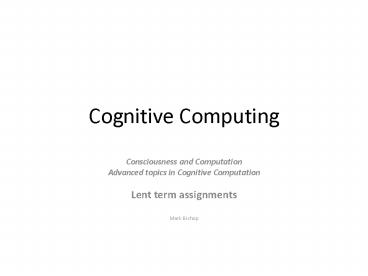Cognitive Computing - PowerPoint PPT Presentation
Title: Cognitive Computing
1
Cognitive Computing
- Consciousness and Computation
- Advanced topics in Cognitive Computation
- Lent term assignments
- Mark Bishop
2
Consciousness and Computations
- Formative (30)
- Prove that the machine NORMA_STACK is no more
powerful than the universal machine NORMA by
designing two MACROs to implement - (a) XPOP which removes the top value from the
STACK and places it into the X register(b) PUSH
(X) which places the contents of the X register
on to the top of the STACK - and submit a short (no more than 1-page) report
detailing their operation. - Summative (70)
- A 3000 word researched essay, An introduction to
Wiedermann and Leeuwens Autopoietic Automata
(AA) theory (submitted by 5pm, Friday 22nd
March, 2013). - It is anticipated that at minimum - student
essays will address - (a) the Turing model of computation
- (b) the Interaction model of computation
- (c) what is an AA?
- (d) what is the relation of AAs to other models
of computation (e.g. Turing machines, Interaction
machines etc.) - (e) what is the computational power of an AA
- (f) the implications if any of AA (and more
generally the interactive model) for cognitive
science.
3
References
- Amongst other sources students are recommended to
consult - Jan van Leeuwen Jiri Wiedermann (2001) Beyond
the Turing Limit Evolving Interactive Systems.
In Leszek Pacholski Peter Ruzicka, editors
SOFSEM 2001 Theory and Practice of Informatics,
28th Conference on Current Trends in Theory and
Practice of Informatics Piestany, Slovak
Republic, November 24 - December 1, 2001,
Proceedings, Lecture Notes in Computer Science
2234. Springer, pp. 90109. Available at
http//link.springer.de/link/service/series/0558/b
ibs/2234/22340090.htm. - Jan van Leeuwen Jiri Wiedermann (2001) The
Turing machine paradigm in contemporary
computing. In B. Enquist W. Schmidt, editors
Mathematics Unlimited 2001 and Beyond.
Springer-Verlag, p. 1139-1155. - Peter Verbaan, Jan van Leeuwen Jiri Wiedermann
(2004) Complexity of Evolving Interactive
Systems. In Juhani Karhumaki, Hermann A. Maurer,
Gheorghe Paun Grzegorz Rozenberg, editors
Theory Is Forever, Essays Dedicated to Arto
Salomaa on the Occasion of His 70th Birthday,
Lecture Notes in Computer Science 3113. Springer,
pp. 268281. Available at http//springerlink.met
apress.com/openurl.asp?genrearticleampissn0302
-9743ampvolume3113ampspage268. - Jiri Wiedermann (2007) Autopoietic automata
Complexity issues in offspring-producing evolving
processes. Theor. Comput. Sci. 383(2-3), pp.
260269.
4
Advanced topics in Cognitive Computation
- Formative (30)
- Two summary and two background seminars on
chapter(s) from Aleksander, I. Morton, H.,
(2012), Aristotles Laptop the discovery of our
informational mind, World Scientific. - Summative (70)
- (a) A mini (500) word review Aristotles
Laptop the discovery of our informational mind,
World Scientific (the best short review to be
submitted for publication in AISBQ magazine). - (b) A more in-depth (2000 word) researched
review of the work as a whole (the best in depth
review to be submitted for publication in
Cognitive Computation journal) - Both reviews to be submitted by 5pm, Friday 22nd
March, 2013 at a minimum both reviews should
discuss (a) what is the core thesis of the text
and (b) is this thesis convincing. The second
(extended) review should also (a) identify and
outline the relationship of the text to other key
works in the field and (b) offer at least some
critical analysis of the ideas.
5
Seminar lists
- C2/Week 2 Stephen summary Emily background
- C3/Week 3 Asei summary Monica background
- C4/Week 4 Monica summary Asei background
- C5/Week 5 Emily summary Stephen background
- READING WEEK
- C6/Week 7 Anna summary Emily background
- C7/Week 8 Monica summary Asei background
- C8/Week 9 Emily summary Monica background
- C9/Week 10 Asei Summary Stephen background
- C10/Week 11 Stephen summary Anna REVIEW
6
Research project and Dissertation
- The research project is a substantial software
implementation in the broad area of Cognitive
Computing. - The project aims to allow students to put into
practice some of the newly acquired cognitive
computing techniques on either a technical
implementation - for example the use of AI or
Neural Networks in a computer game - or an
experimental investigation of some cognitive
phenomena (e.g. change blindness). - Selection of an appropriate research project is
one aspect of the assessment process.
7
Requirements
- Students implement a Cognitive Computing project
and dissertation, which should include a suitable
literature search of the research area,
emphasising the methodological aspects of the
work. - Students should select their project during terms
one and two, by liaising with potential research
supervisors (check out faculty web pages for
research interests) and submit a project form
(indicating project supervisors) by the end of
term two (the form is provided in the course
handbook). - This is a formal requirement for progression if
the project form has not been submitted, then the
student will not be allowed to progress to
dissertation.
8
Length etc.
- During the third term students should make
arrangements to meet with their project
supervisor on at least four occasions twice at
the start of the project (to introduce the
project confirm key project questions and
strategy etc) and twice towards the end of term
three (to confirm the thesis outline demonstrate
any project work and/or highlight key
experimental findings review answers to research
questions demonstrate an appropriate academic
writing writing style etc). - The course is primarily assessed via a
substantial 15-20,000 word dissertation together
with an appropriate software implementation
and/or series of experiments. - Research only projects can be considered in
exceptional circumstances. - The dissertation must be completed by the end of
the third term (20rd September 2013).































